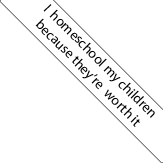Criminalizing Home Schoolers
By KRISTIN KLOBERDANZ/MODESTO Sat Mar 8, 9:45 AM ET
Parents of the approximately 200,000 home-schooled children in California are reeling from the possibility that they may have to shutter their classrooms - and go back to school themselves - if they want to continue teaching their own kids. On Feb. 28, Judge H. Walter Croskey of the Second District Court of Appeals in Los Angeles ruled that children ages six to 18 may be taught only by credentialed teachers in public or private schools - or at home by Mom and Dad, but only if they have a teaching degree. Citing state law that goes back to the early 1950s, Croskey declared that "California courts have held that under provisions in the Education Code, parents do not have a constitutional right to home school their children." Furthermore, the judge wrote, if instructors teach without credentials they will be subject to criminal action.
This news raised a furor among home schooling advocates, including government officials. "Every California child deserves a quality education and parents should have the right to decide what's best for their children," Governor Arnold Schwarzenegger said in a statement today. "Parents should not be penalized for acting in the best interests of their children's education. This outrageous ruling must be overturned by the courts and if the courts don't protect parents' rights then, as elected officials, we will." "It's kind of scary," says Julie Beth Lamb, an Oakdale, California, parent who, with no teaching credentials, has taught her four children for 15 years. "If that ruling is held up, this would make us one of the most restrictive states in the nation."
The debacle originated with a suit over child abuse. One of the eight children of Philip and Mary Long, a Los Angeles couple, had filed a complaint of abuse and neglect with the L.A. Department of Children and Family Services. The agency determined that the Long children were being home schooled, taught by their uncredentialed mother while officially enrolled in independent study at Sunland Christian School. The DCFS then turned to the courts to mandate that the children attend public school so that teachers might spot evidence of abuse (a charge the parents deny). A juvenile court, however, determined that the Longs had a constitutional right to home school their children. The DCFS appealed and the case landed in Croskey's appellate court.
For years, the state of California has allowed parents to home school as long as they file papers to create a private school and hire a tutor with credentials or if their child participates in an independent study program through a credentialed school. In evaluating the Long case, however, Judge Croskey found that state law forbade any home schooling that was not taught by a credentialed teacher and that what California had been allowing was, in his judicial opinion, illegal. In 1953, another appellate court ruled against home-schooling parents who didn't want to adhere to California's compulsory education laws, which require kids between six and 18 to attend a credentialed school. The current case is most likely to be appealed to California's Supreme Court.
"We weren't trying to change the law on home schooling," says Leslie Heimov of the Children's Law Center, which represents the Long children involved in the case. "The law is accurate - it hasn't changed since the 1950s." She says the Center does not even have an opinion on home schooling. They just wanted to do what was best for the children represented in the case.
The fact that this sweeping ruling has sprung from such an individualized case is what has most outraged home schooling advocates. "Public schools are not a solution to the problem of child abuse," says Leslie Buchanan, president of the HomeSchool Association of California. Jack O'Connell, California State Superintendent of Public Instruction - the equivalent of a department of education - now faces the potential crisis of dealing with tens of thousands of truants. Does he know what will happen next? "I honestly don't know," O'Connell says, adding that his department is reviewing the case. "There is some angst in the field." View this article on Time.com






No comments:
Post a Comment